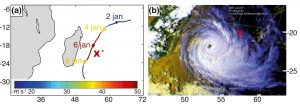l’article du mois – septembre 2016
 Regionalizing Rainfall at Very High Resolution over La Réunion Island: A Case Study for Tropical Cyclone Ando
Regionalizing Rainfall at Very High Resolution over La Réunion Island: A Case Study for Tropical Cyclone Ando
par Benjamin Pohl, Béatrice Morel, Christelle Barthe et Olivier Bousquet
Ensemble simulations of Tropical Cyclone (TC) Ando (31 December 2000–9 January 2001) are performed over the southwest Indian Ocean using the nonhydrostatic WRF Model. Nested domains centered over the island of La Réunion allow for the simulation of local rainfall amounts associated with TC Ando at very high resolution (680-m grid spacing).
The model is forced by and nudged toward ERA-Interim during the first (1–6) day(s) of the TC’s life cycle. The nudging ends at various dates to constrain either the whole life cycle or only parts of it. As expected, results show weakened member dispersion, as the relaxation lasts longer, with more members producing similar cyclone tracks and intensities. The model shows reasonable skill to simulate local rainfall amounts and distribution, as soon as the simulated TC approaches La Réunion with a realistic distance and azimuth. Strong lower-level wind associated with the TC is forced to ascend over the slopes of the island.
The model is able to successfully simulate the extreme daily precipitation amounts (1200 mm) and their distribution over the highest parts of La Réunion. Smaller-scale features of the rainfall field are nevertheless less realistic in the simulations. The wind speed and direction upstream of the island are the main drivers of such local uncertainties and errors, and they appear as an important issue to assess the local impacts of the TC over such a complex terrain.
- extrait:
- lien_externe:
- kc_data:
- a:8:{i:0;s:0:"";s:4:"mode";s:0:"";s:3:"css";s:0:"";s:9:"max_width";s:0:"";s:7:"classes";s:0:"";s:9:"thumbnail";s:0:"";s:9:"collapsed";s:0:"";s:9:"optimized";s:0:"";}
- kc_raw_content:
 Regionalizing Rainfall at Very High Resolution over La Réunion Island: A Case Study for Tropical Cyclone Ando
Regionalizing Rainfall at Very High Resolution over La Réunion Island: A Case Study for Tropical Cyclone Andopar Benjamin Pohl, Béatrice Morel, Christelle Barthe et Olivier Bousquet
Ensemble simulations of Tropical Cyclone (TC) Ando (31 December 2000–9 January 2001) are performed over the southwest Indian Ocean using the nonhydrostatic WRF Model. Nested domains centered over the island of La Réunion allow for the simulation of local rainfall amounts associated with TC Ando at very high resolution (680-m grid spacing).
The model is forced by and nudged toward ERA-Interim during the first (1–6) day(s) of the TC’s life cycle. The nudging ends at various dates to constrain either the whole life cycle or only parts of it. As expected, results show weakened member dispersion, as the relaxation lasts longer, with more members producing similar cyclone tracks and intensities. The model shows reasonable skill to simulate local rainfall amounts and distribution, as soon as the simulated TC approaches La Réunion with a realistic distance and azimuth. Strong lower-level wind associated with the TC is forced to ascend over the slopes of the island.
The model is able to successfully simulate the extreme daily precipitation amounts (1200 mm) and their distribution over the highest parts of La Réunion. Smaller-scale features of the rainfall field are nevertheless less realistic in the simulations. The wind speed and direction upstream of the island are the main drivers of such local uncertainties and errors, and they appear as an important issue to assess the local impacts of the TC over such a complex terrain.
